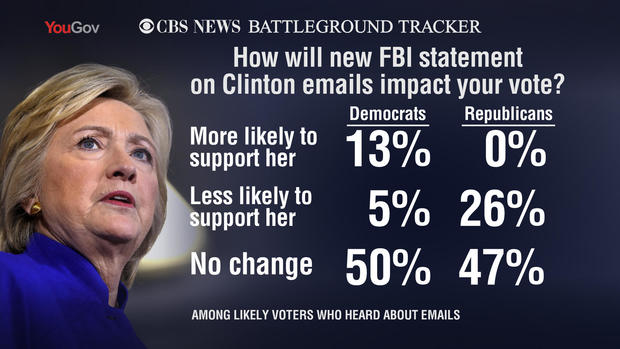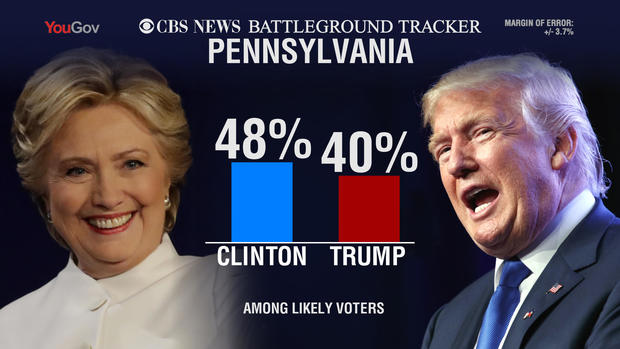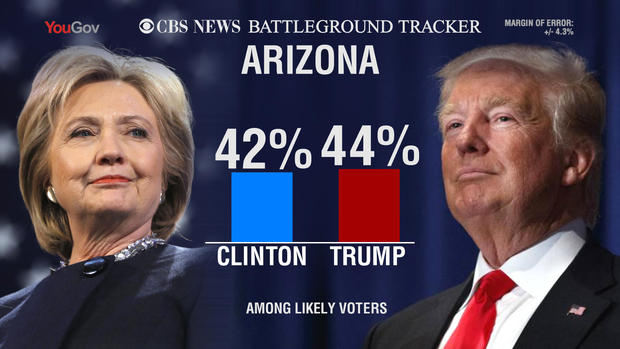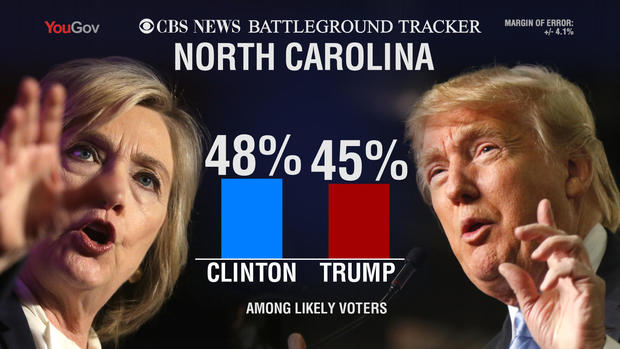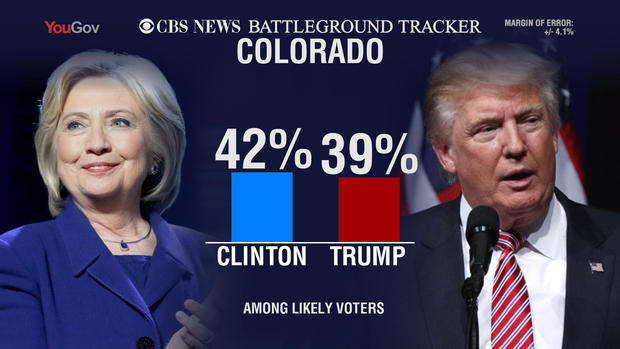CBS battleground poll: Partisans divide on news of FBI, emails
News of the FBI’s decision spread quickly through the battleground states – eight in ten likely voters had heard about it by Saturday – and partisans quickly went to their respective corners: Republicans think it’s bad and expect the emails to contain things damaging to Clinton, and most Democrats say too much is being made of it. While a sizeable third of Democrats also say it’s bad, we found yet another reminder that the election has become a relative choice between the two candidates: those same Democrats also feel the email matter is not as bad as things they dislike about Donald Trump, so they aren’t re-evaluating their vote.
The survey was done following the announcement, across the thirteen “battleground” states.
There’s a suggestion the new email issue could limit Clinton’s chances of growing beyond the base that already supports her. Only 5 percent of Democrats say it could make them less likely to vote for Clinton, and among voters overall, 71 percent say it either won’t change their thinking, or in some cases, they’re already voted.
Most of those who say they’re less likely to vote for Clinton are Republicans, who are not supporting her anyway. Just 5 percent say it all depends on what is in the emails, a wait-and-see approach. Overall, 52 percent of battleground voters expect the emails to contain “more of what we already know” and 48 percent - the largest group of which are Republicans – expect things that are additionally damaging to Clinton.
The email matter has long been linked to the low ratings Clinton gets on being “honest and trustworthy,” and in the individual states surveyed this week, those numbers continued to be low for her, even as interviewing was wrapped up prior to the FBI news. Those figures are just one-third in Pennsylvania, just 34 percent in North Carolina, states in which she leads despite those ratings and despite trailing Donald Trump on those ratings. Many of Clinton’s own voters also don’t describe her as honest – one-third do not in Colorado, nearly one-third do not in North Carolina - and fewer than half of voters overall in North Carolina feel she would act with integrity as President.
That could be one important reason voters – and in particular, Democrats, who support Clinton in large numbers - said they were not re-evaluating, because few already described her as honest and trustworthy. Their criteria has throughout the campaign been more focused on items like experience and the commander-in-chief test.
This week the Battleground Tracker also surveyed four states individually – Pennsylvania, Arizona, North Carolina and Colorado. Clinton leads in three of the four. She’s up eight in Pennsylvania – a state critical to Trump’s electoral math, has a three-point lead in both North Carolina and Colorado, and Trump keeps his two-point edge in Arizona. Interviewing was largely wrapped up before the news of the emails, but given the results of the subsequent survey, one might not expect those findings to be much affected.
And the larger demographic difference defining the race between Clinton and Donald Trump has been a gender gap – slightly larger now than the last time in these states – that offsets a smaller movement of Republicans to Trump. Pennsylvania is a particular example of where the difference in party support costs Trump: he gets 78 percent of Republicans while Clinton gets 88 percent of Democrats.
Voters across all the battlegrounds do see a longer-term impact if Clinton should win: just as many (39 percent) think this scandal will stop her from getting things done if she becomes President, as say it’ll be relegated to something only her opponents care about.
Trump does own the enthusiasm gap -- In North Carolina, 56 percent of his voters say they’re more enthusiastic than they’ve been before, 26 percent less so. In Arizona 54 percent of his voters are more enthusiastic than recent years, 27 percent less, for example. Clinton’s numbers are very different. In North Carolina 31 percent of her voters say they’re more enthusiastic than past years, and 30 percent less so. In Colorado it’s just 26 percent more enthusiastic, outweighed by 40 percent who are less. Still, these voters say they’re definitely voting – as do Trump’s – so this year enthusiasm for a candidate may not the biggest factor driving turnout.
This CBS News 2016 Battleground Tracker is a panel study based on 4,074 interviews conducted on the internet of registered voters in Arizona, North Carolina, Pennsylvania and Colorado on October 26-28, 2016 and 4,500 interviews in thirteen battleground states (Arizona, Colorado, Florida, Georgia, Iowa, Michigan, North Carolina, New Hampshire, Nevada, Ohio, Pennsylvania, Virginia, and Wisconsin) on October 28-29, 2016 for a brief recontact survey regarding the FBI statement. The margin of error for the full battleground survey is +/- 1.9 percent; for Arizona ±4.3 percent for North Carolina ±4.1 percent, for Colorado ±4.1 percent, for Pennsylvania ±3.7 percent
